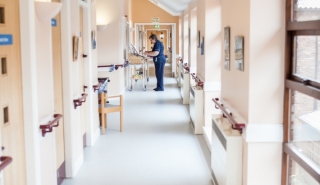In this section
Infected Blood Inquiry: information and support
The final report of the Infected Blood Inquiry, led by Sir Brian Langstaff KC, has now been published.
This independent public statutory inquiry was established to examine the circumstances in which men, women and children treated by national health services in the United Kingdom were given infected blood and infected blood products, in particular since 1970.
You can read the report on the Inquiry website.
Our thoughts are foremost with those patients who were given infected blood and blood products, and their families and the wider community who have been impacted.
We recognise that the report will cause concern for many people, including worries about their own health, and patients who have been treated at York and Scarborough Teaching Hospitals may have questions and require support.
The following Q&A will help signpost you to information and support.
How safe are blood and blood products now?
Modern safety standards are extremely rigorous, and NHS Blood and Transplant's services follow strict guidelines and testing to protect both donors and patients and are subject to regular inspections by independent regulators. More details about the safety of blood from donations in England can be found online.
Since 1991, all blood donated in the UK is screened and distributed by NHS Blood and Transplant following rigorous safety standards and testing to protect both donors and patients.
Since testing has been introduced, the risk of getting an infection from a blood transfusion or blood products is very low.
All blood donors are screened at every donation and every donation is tested before it is sent to hospitals. Blood services and blood safety has been transformed, not only in terms of technological advances in testing but also in the way donors are recruited and checked they are safe to donate.
Given the time that has elapsed since the last use of infected blood products, most of those who were directly affected have been identified and started appropriate treatment. However, there may be a small number of patients where this is not the case, and particularly where they are living with asymptomatic hepatitis C.
Where can I get further information about testing, or any other support I may need?
A range of support and advice is available, as follows:
General information
NHS Infected Blood Inquiry support website
Support with testing
If you are concerned about a possible hepatitis C infection, you can book a home NHS test online. The tests are free and confidential. To receive a self-testing kit which can be quickly dispatched to your home visit hepctest.nhs.uk.
Hepatitis B is also linked to infected blood, this usually clears up on its own without treatment, but could develop into chronic hepatitis B. Patients can find out more information here - hepatitis B information
HIV testing is also provided to anyone free of charge on the NHS. Home testing and home sampling kits are also available. You can find out more about HIV testing and the HIV testing services search tool on the NHS website.
Financial Support
The England Infected Blood Support Scheme was set up to support people historically infected with hepatitis C and/or HIV from NHS blood or blood products. Help is also offered to families, civil or long-term partners after the death of someone infected: England Infected Blood Support Scheme | NHSBSA
Psychological Support
The Red Cross provides a confidential support service to people infected and affected with Infected Blood by telephoning: 0800 458 9473 or 020 3417 0280.
The HBCDA (Haemophilia and Bleeding Disorders Counselling Association) charity offers online support and counselling specifically for people with bleeding disorders who have been infected through treatment for their bleeding disorder: HBDCA Main
Support for individuals or their families who have a diagnosed bleeding disorder and are registered at a haemophilia centre:
For those who are currently registered at York Haemophilia Centre and who are under active follow up in the service, support and advice can be provided by speaking to your specialist nurses or doctors at clinic or by telephoning the access number on your bleeding disorder card.
How do I know if I am risk of having contracted a viral infection from treatment, I have received for my bleeding disorder?
If you are a patient with a bleeding disorder and have received coagulation factor products, blood, or blood components before the end of 1991, you should ask your specialist bleeding disorder team for advice. Most people registered at UK Haemophilia centres treated in the 1970s and 80s and up until 1991, have already been offered testing for HIV and hepatitis. If you need an explanation about your tests or their results, your doctor will be able to discuss this with you. If you have not been tested, your doctor can explain the appropriate blood tests and arrange these for you.
I am receiving or may need to receive products to treat my bleeding disorder in the future. Are these treatments safe?
There have been many advances in the treatment of bleeding disorders in recent years that have made treatments much safer. Whenever possible, “man-made” products are now used that are not derived from blood and are very unlikely to transmit infections. Some disorders still require treatment with products derived from blood. The safety of these products has been vastly improved by introducing widespread screening of blood donors for viral infections and by use of several proven methods of inactivating viruses during the manufacture of plasma derived products. Your doctor will be able to give you full information about your treatment.
I know I have been infected through treatment for my bleeding disorder. How can I obtain practical and psychological support to help me?
Your haemophilia multidisciplinary team can provide information and support for you and signpost you to other resources.






